Daily Vocabulary Words: List of Daily Used Words in Leading Indian Newspapers
Hi there. Welcome to this special section @ Wordpandit. Our endeavour here is straightforward: highlighting daily vocabulary words that you would come across in leading newspapers in the country. We have included the following newspapers in our selection:
• The Times of India
• The Economic Times
• Hindustan Times
• Mint
• Indian Express
We are putting in extensive work to develop your vocabulary. All you have to do is be regular with this section and check out this post daily. This is your repository of commonly used words; essentially, we are posting a list of daily used words. Hence, this has significant practical application as it teaches you words that are commonly used in leading publications mentioned above.
Visit the website daily to learn words from leading Indian newspapers.
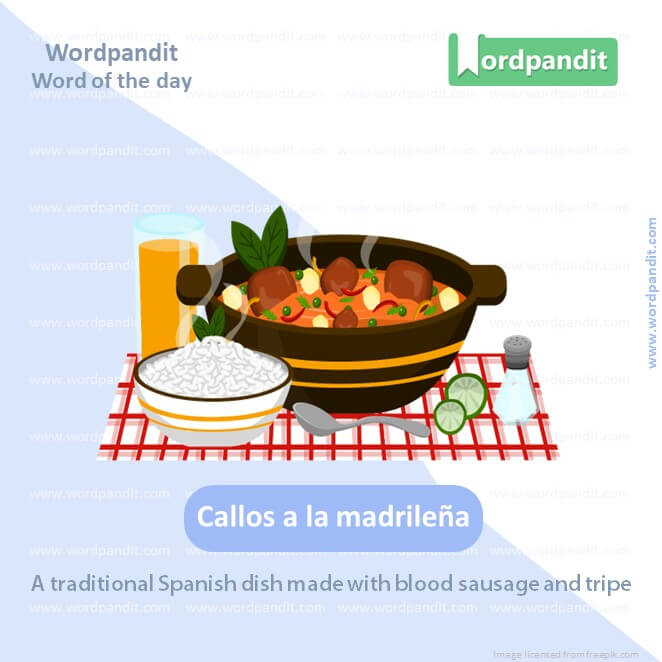
WORD-1: Callos a la madrileña
CONTEXT: The food festival showcased a plethora of international dishes, with ‘Callos a la madrileña’ emerging as a favorite among the attendees. The Times of India
EXPLANATORY PARAGRAPH: Callos a la madrileña is a special dish from Spain, like how we have our favorite meals at home. People in Madrid, a place in Spain, really like this. It’s made from some parts of a cow’s tummy and is spicy and yummy!
MEANING: A traditional Spanish dish made with blood sausage and tripe (noun).
PRONUNCIATION: Kahyos ah lah madrilyaynya
SYNONYMS: Spanish stew, Madrilenian dish, Beef tripe stew, Madrid’s special, Spanish delicacy
USAGE EXAMPLES:
1. We tasted Callos a la madrileña during our trip to Spain.
2. Many restaurants in Madrid offer Callos a la madrileña on their menus.
3. Maria made a delicious pot of Callos a la madrileña for the family dinner.
4. The rich flavors of Callos a la madrileña make it a favorite among locals.
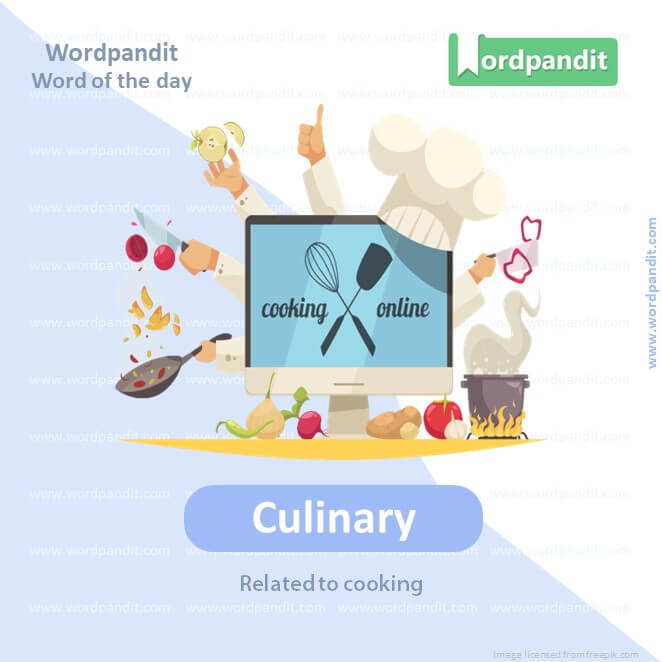
WORD-2: Culinary
CONTEXT: The culinary landscape of India has been in constant evolution, thanks to the confluence of various cultures and traditions. Hindustan Times
EXPLANATORY PARAGRAPH: Culinary is a fancy word that talks about cooking and making food. If you love playing in the kitchen and trying out new recipes, then you’re exploring the culinary world!
MEANING: Related to cooking (adjective).
PRONUNCIATION: Kuhluhnairee
SYNONYMS: Cooking, Food-related, Gastronomic, Kitchen-based, Cookery, Edible, Gourmet
USAGE EXAMPLES:
1. She took a culinary class to improve her cooking skills.
2. The culinary delights at the festival made everyone’s mouth water.
3. Chef Raj is renowned for his culinary expertise.
4. The city offers a wide range of culinary experiences for food lovers.
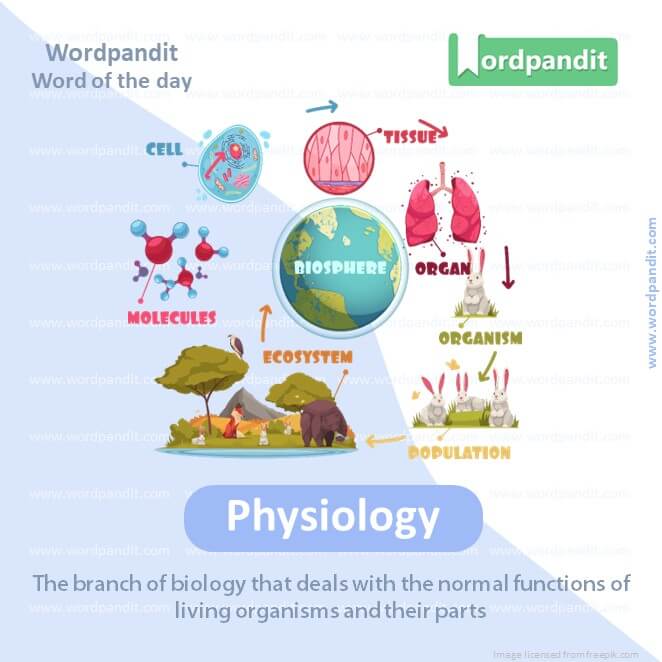
WORD-3: Physiology
CONTEXT: The Physiology department at Delhi University has received a grant to conduct groundbreaking research on the effects of air pollution on lung health. Indian Express
EXPLANATORY PARAGRAPH: Physiology is like a guidebook for our bodies. It tells us how different parts of our body work and play together, like how our heart pumps blood or how we breathe.
MEANING: The branch of biology that deals with the normal functions of living organisms and their parts (noun).
PRONUNCIATION: Fizzeeoluhjee
SYNONYMS: Biology, Anatomy, Biomechanics, Body science, Life science
USAGE EXAMPLES:
1. Dr. Smith is an expert in human physiology.
2. In school, we learned the physiology of the respiratory system.
3. Physiology helps doctors understand how the body works.
4. Studying physiology can be fascinating for those curious about life.
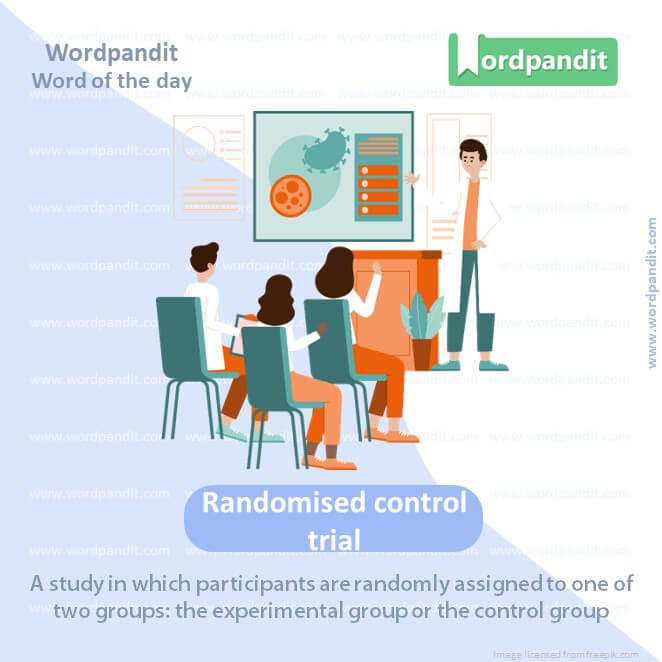
WORD-4: Randomised control trial
CONTEXT: The latest medication for diabetes is undergoing a randomised control trial to ensure its efficacy and safety. The Economic Times
EXPLANATORY PARAGRAPH: Imagine testing two new toys to see which is more fun. You let half your friends play with toy A and the other half with toy B, without letting them choose. This fair way of testing is called a randomised control trial.
MEANING: A study in which participants are randomly assigned to one of two groups: the experimental group or the control group (noun).
PRONUNCIATION: Randuhmized kontrol tryul
SYNONYMS: Clinical trial, Controlled test, Experimental study, Intervention trial, Placebo-controlled trial
USAGE EXAMPLES:
1. The medicine was tested in a randomised control trial before being sold in stores.
2. Doctors trust treatments that have passed a randomised control trial.
3. The new therapy underwent a randomised control trial last year.
4. Many scientists believe that a randomised control trial is the best way to test new treatments.
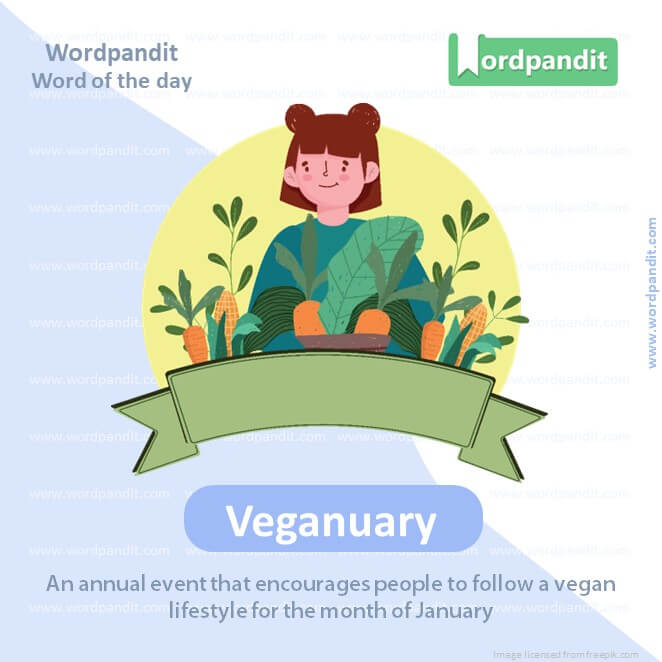
WORD-5: Veganuary
CONTEXT: With the rising trend of veganism in India, many are gearing up to participate in ‘Veganuary’, a monthlong pledge to eat vegan in January. Mint
EXPLANATORY PARAGRAPH: Veganuary is a special time when some people choose not to eat any animal products, like meat, milk, or eggs, for the whole month of January. It’s like a challenge to eat plants only!
MEANING: An annual event that encourages people to follow a vegan lifestyle for the month of January (noun).
PRONUNCIATION: Veeganyooairee
SYNONYMS: Vegan challenge, January vegan pledge, Plant-based month, Meat-free January, Vegan month
USAGE EXAMPLES:
1. Many people participate in Veganuary to promote animal rights.
2. Restaurants offer special menus during Veganuary.
3. Veganuary has grown in popularity over the past few years.
4. Trying Veganuary can be a great way to explore new recipes.
WORD-6: Veil
CONTEXT: The recent fashion week in Mumbai saw designers experimenting with the traditional veil, giving it a modern twist. The Times of India
EXPLANATORY PARAGRAPH: A veil is like a thin curtain or piece of cloth that people, especially women, wear over their faces or heads. Sometimes, they wear it for a special occasion, like a wedding, or to follow a tradition.
MEANING: A piece of fine material worn to cover the face or head (noun).
PRONUNCIATION: Vayl
SYNONYMS: Covering, Mask, Shroud, Curtain, Mantilla
USAGE EXAMPLES:
1. She wore a beautiful veil on her wedding day.
2. The dancer’s veil flowed gracefully with her movements.
3. In some cultures, wearing a veil is a sign of respect.
4. The statue was unveiled by removing its veil.
WORD-7: Convergence
CONTEXT: The convergence of technology and finance is ushering in a new era for India’s banking sector. The Economic Times
EXPLANATORY PARAGRAPH: Imagine two friends walking towards each other from different directions and then meeting at a playground. This meeting or coming together is called convergence.
MEANING: The act or state of moving towards the same point from different directions (noun).
PRONUNCIATION: Kunvurjens
SYNONYMS: Meeting, Merging, Union, Junction, Intersection
USAGE EXAMPLES:
1. The convergence of technology and art can produce amazing results.
2. The town is located at the convergence of two rivers.
3. There’s a convergence of ideas in the team’s new project.
4. The conference aims to promote the convergence of different fields of study.
WORD-8: Malaise
CONTEXT: The prolonged economic downturn has resulted in a general malaise among investors, leading to a slowdown in market activities. Hindustan Times
EXPLANATORY PARAGRAPH: Malaise is like feeling a bit icky or tired without a clear reason, kind of like when you’re sleepy but don’t know why.
MEANING: A general feeling of discomfort or unease without a specific cause (noun).
PRONUNCIATION: Malayz
SYNONYMS: Unease, Discomfort, Unwellness, Lethargy, Ailment
USAGE EXAMPLES:
1. She was taken to the doctor due to her persistent malaise.
2. There’s a general malaise in the team since they lost the game.
3. The bad news spread a sense of malaise throughout the community.
4. He tried to shake off the malaise by going for a long walk.
WORD-9: Indelible
CONTEXT: The legacy of Mahatma Gandhi has left an indelible mark on the conscience of the nation, reminding us of the power of nonviolence. Indian Express
EXPLANATORY PARAGRAPH: Indelible is like a marker that doesn’t wash off. Once you draw or write with it, it stays there for a very, very long time.
MEANING: Making marks that cannot be removed or forgotten (adjective).
PRONUNCIATION: Indeluhbul
SYNONYMS: Permanent, Unfading, Everlasting, Immutable, Unforgettable
USAGE EXAMPLES:
1. Her kindness left an indelible mark on my heart.
2. Be careful with that ink; it’s indelible.
3. The experience was an indelible memory for him.
4. He made an indelible impression during his speech.
WORD-10: Masquerading
CONTEXT: Officials have issued a warning about fraudulent companies masquerading as legitimate investment opportunities. Mint
EXPLANATORY PARAGRAPH: Masquerading is like playing dress-up or pretend. Imagine wearing a superhero costume and acting like one, even if you’re not really a superhero. That’s what masquerading is – pretending to be someone or something you’re not.
MEANING: Pretending to be someone or something else (verb).
PRONUNCIATION: Maskahrayding
SYNONYMS: Pretending, Impersonating, Posing, Feigning, Disguising
USAGE EXAMPLES:
1. The thief was masquerading as a waiter during the event.
2. She was masquerading her true feelings with a smile.
3. There are many products masquerading as genuine in the market.
4. The children enjoyed masquerading as their favorite characters.
Vocabulary Spelling
In the rich tapestry of language learning, getting the ‘vocabulary spelling’ right forms a significant thread. These spelled words or the arrangement of letters give each word its unique identity. However, understanding ‘vocabulary spelling’ proficiently needs an insightful and strategic approach.
Starting the journey of learning ‘vocabulary spelling’, one must focus on observing patterns. English language words often follow certain spelling rules or patterns. Recognizing these can simplify the learning process, offering a systematic way to appreciate ‘vocabulary spelling’.
The trick to ingraining ‘vocabulary spelling’ effectively lies in the power of repetition. Regularly writing words can help reinforce the spelling in your memory. To boost this, tools like spelling quizzes or flashcards with the word on one side and the spelling on the other can provide an engaging way to practice ‘vocabulary spelling’.
An unconventional yet powerful approach to remember ‘vocabulary spelling’ is by using mnemonic devices. For instance, connecting the word’s spelling with a catchy phrase or rhyming pattern can make recall easier.
Integrating technology with learning ‘vocabulary spelling’ has its unique benefits, too. Apps offer various exercises and tests that not only enhance memory but also make learning fun.
Importantly, the learning of ‘vocabulary spelling’ should be punctuated with regular revisions. This ensures the recalled spelling is correct and cements it in your long-term memory.
In a nutshell, mastering ‘vocabulary spelling’ requires keen observation, regular practice, innovative mnemonic tools, use of technology, and timely revisions. As you follow this comprehensive path, you strengthen your grasp over ‘vocabulary spelling’, paving the way to language proficiency. Remember, every word spelled correctly is a moment of triumph in the enthralling escapade of language learning!













